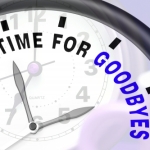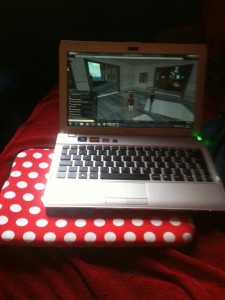Ending conversations can sometimes be awkward, particularly if we are online. If we are in the physical presence of someone, there are clues from our body language that we are about to move away – sometimes a kiss on the cheek, a handshake, or a facial expression that denotes a cheery farewell or that the situation is at an end. But what is the protocol when we are online? Have we got used to the often unfamiliar ending of a communication, or do we need to take more care to ensure we have prepared for when a chat comes to an end?
A colleague of mine once told me that she found the end of a social conversation with her daughter on Skype unbearable because she had to  actively turn the camera off, even though this was done by clicking a phone-down icon. She felt that she was somehow clicking an off button on her daughter herself, leaving the teenager statically in place for ever, rather than ending a call. Another felt that her continued presence on a platform such as Google, denoted by the green “available” dot, meant that she felt pressured to make herself invisible after a chat session, despite a clear goodbye once the chat session had been ended.
actively turn the camera off, even though this was done by clicking a phone-down icon. She felt that she was somehow clicking an off button on her daughter herself, leaving the teenager statically in place for ever, rather than ending a call. Another felt that her continued presence on a platform such as Google, denoted by the green “available” dot, meant that she felt pressured to make herself invisible after a chat session, despite a clear goodbye once the chat session had been ended.
And yet, when texting via our phones, we rarely actively end a conversation, leaving an endlessly open channel of communication which remains formally unended! And now we switch from platform to platform and device to device to communicate – just yesterday I held one conversation via my laptop, smartphone and tablet via text message, GoogleChat and Hangouts. I don’t dare download SnapChat…
I’ve been thinking about this because we need to prepare clients for the end of a session which by its nature has less formality than closing a door behind someone, as we generally do after a face-to-face session. As part of their learning, Online Therapy Institute students learn how to do this effectively, both for synchronous communication and for those exchange-of-message situations that don’t take place at the same time, such as when we use email. Our face-to-face clients have the formality of a clock denoting a set time, getting up from the chair, a door opening and closing, and then the journey home to mark an ending. When working online, we tend to be in the same position with the same screen after therapy has ended – this doesn’t tend to foster the sense of closure that we need to hold the client until the next session.
Or perhaps I am over-thinking this!
But before I say goodbye, take some time to consider how that your last goodbye at the end of the session may have felt to the other person. Was it too abrupt, leaving them uncared for and brushed off? Or did you over-compensate for the lack of physical presence, wanting to be the last person to speak before the camera went off or to have the last word in the overall therapy contract via email?
It’s sometimes a fine line to manage closure – perhaps a little mindfulness of how we actively do it may be in order to ensure the other person isn’t left hanging!
Goodbye!
P.S thanks to FreeDigitalPhotos.Net and Stuart Miles for the image! Goodbye!


